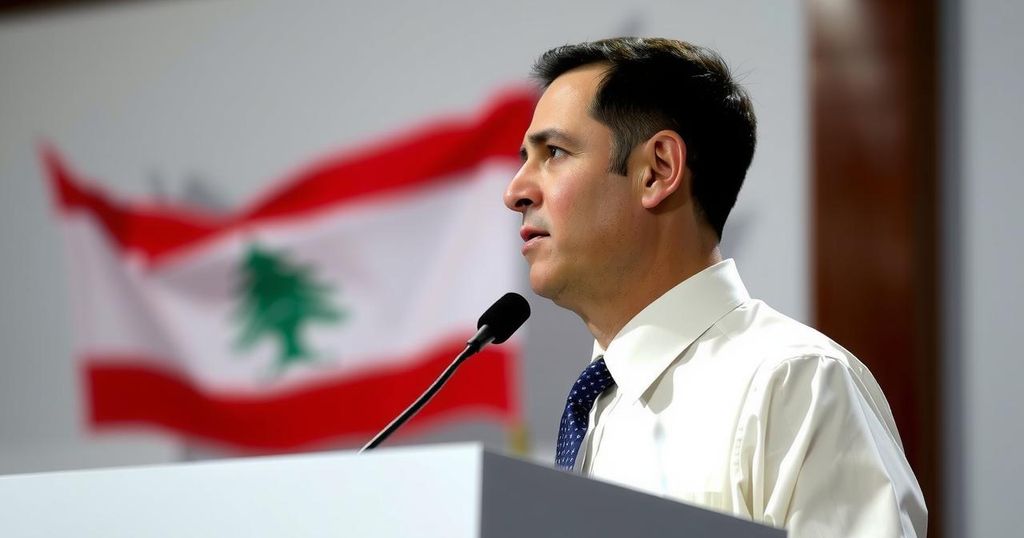Lebanon is preparing to elect a new president this week after a two-year leadership void. The election is critical amid ongoing economic challenges and a recent ceasefire agreement between Israel and Hezbollah. Joseph Aoun, the commander-in-chief of the Lebanese armed forces, is seen as a key candidate, reflecting a potential shift in Hezbollah’s political strategy. The election outcome will be pivotal to restoring effective governance in Lebanon.
Lebanon is poised to elect a new president this week, marking a significant potential shift after two years without a proper head of state. The president’s role has become critical due to the recent ceasefire between Israel and Hezbollah, necessitating leadership to enforce the agreement before its expiration at the end of January. The current transitional government, led by Prime Minister Najib Mikati, has struggled to address the nation’s pressing economic and political crises.
The upcoming election occurs amid Lebanon’s prolonged economic recession, which has resulted in frozen bank deposits and sharp declines in the value of the Lebanese pound. Moreover, fighting between Hezbollah and Israel has inflicted extensive damage on the nation, with approximately 1.3 million citizens internally displaced. The government seeks a leadership capable of facilitating the return of displaced individuals and Syrian refugees.
Michael Bauer, head of the Beirut office of the Konrad Adenauer Foundation, emphasizes the need for a president who can genuinely herald a fresh start rather than merely serving as a consensus candidate among the factions in parliament. The urgency surrounding the election has placed immense pressure on political parties to support viable presidential candidates, reflecting Lebanon’s complex ethnic and religious mosaic.
Joseph Aoun, the Maronite Christian commander-in-chief of the Lebanese armed forces, emerges as the most viable candidate. His candidacy is buoyed by a shift in Hezbollah’s stance towards accepting a candidate outside their previously favored choice, Sleiman Frangieh. This reconsideration is partly influenced by Hezbollah’s waning political influence due to recent conflicts.
Aoun’s reputation stems from the army’s diminished but positive standing among the Lebanese public. According to Bauer, “A ‘President Joseph Aoun’ would be someone who would represent a new, positive force for many Lebanese.” His military background would position him well to tackle emerging security challenges, which adds to his appeal as a presidential contender.
Ultimately, whatever the election outcome may be, the urgent necessity for a new president is clear. Following years of ineffective governance, Lebanon requires a legitimized government to function effectively. The opportunity for electing a president represents a critical first step towards stabilizing Lebanon’s governance.
Lebanon’s political landscape has been marked by instability, particularly notable in the absence of a functioning presidency over the past two years. This vacuum has been compounded by severe economic challenges and social unrest. The Lebanese constitution empowers the prime minister and Cabinet, yet their effectiveness has been hindered due to the multifaceted crises the nation faces, including a dire economic situation and the fallout from regional conflicts, primarily involving Israel and Hezbollah. The context surrounding the upcoming election includes a recent ceasefire agreement, heightening the need for a strong presidential candidate to consolidate peace efforts and facilitate the return of displaced persons. In a nation characterized by diverse ethnic and religious groups, the selection process for political leaders must align with Lebanon’s confessional system, making the upcoming election particularly intricate yet critical in determining the country’s future.
In conclusion, the imminent presidential election holds promise for Lebanon as it seeks to establish governance after two years of turmoil. A credible candidate is essential to instill stability amid the prevailing crises. The prospect of Joseph Aoun gaining sufficient support underscores the potential for positive change in Lebanon’s political landscape. Should a new president effectively address the nation’s pressing challenges, Lebanon may be poised for a significant progression towards recovery and stability.
Original Source: www.dw.com






